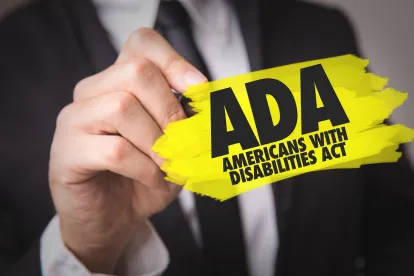As more people are home by mandate or for public safety, online orders for groceries, sundries, and apparel are increasing exponentially. Before social distancing was required or recommended, Earnest Research estimated Instacart, Amazon, and Walmart saw at least a 65 percent online sales increase compared to the same time last year. Similarly, families are requesting more meal deliveries from apps like DoorDash, Uber Eats, and Postmates. Consumer-facing industries (e.g., retail, restaurants, hospitality, banking, online education, etc.) are benefiting from increased online and app order demands, and businesses must ensure their websites and apps are accessible to everyone.
Lawsuits filed in 2019 alleged blind or visually impaired consumers could not use company websites or gift cards that were not in Braille. Both are violations of theAmericans with Disabilities Act(ADA) of 1990. While suits started in New York, Florida, and California, the litigation storm has spread across the country. Consumer companies need to recognize the benefits of making their websites, gift cards, and services accessible and available to all. It is especially important as more people require assistive devices to access websites. During the COVID-19 pandemic, new and established consumer-facing businesses must take steps to ensure accessibility for all.
The ADA requires places of public accommodation (e.g., retail stores, rentals, educational institutions, recreational facilities, and service centers, etc.) to make locations, including websites and mobile device applications, accessible through physical aids and guides. Plaintiffs’ counsel are attempting to extend the theory to gift cards, arguing they are similar to credit cards, making it impossible for blind people to tell the difference. Blind consumers argue they cannot patronize locations offering noncompliant gift cards.
Neither Congress nor the Department of Justice has expressly extended the definition of public accommodation to include websites or gift cards, and the statute only plainly contemplates physical places. Without government assistance, plaintiffs’ counsel have convinced courts to transmogrify selected website accessibility standards by arguing companies that have not satisfied the same are in violation of the law. Counsel are now hoping courts will extend the theory to gift cards.
TheWeb Content Accessibility Guidelines(WCAG), which are promulgated bythe Web Accessibility Initiative(WAI) of theWorld Wide Web Consortium (W3C) are one set of standards. Versions of the WCAG contain 12 guidelines addressing Web accessibility. Guidelines contain criteria to determine conformance at three different levels: A, AA, or AAA (these rankings are akin to minor league baseball levels); however, the WAI does not recommend Level AAA conformance be required, as it is not possible to satisfy all criterion. That said, many lawsuits seek to enforce AAA standards without any legal justification.
Though there is no legally mandated standard for websites or gift cards, all consumer-facing entities should take steps to increase customer accessibility. How can businesses take charge of efforts to ensure accessibility? Many vendors will analyze website URLs, identify gaps, and provide a punch list for entrepreneurs to prioritize. As most companies focus on what they know, they should ensure website vendors have undergone accessibility training and certification and understand compliance with WCAG guidelines.
Whether using a vendor or attempting to create and manage their own sites, companies must make sure their website can be read and navigated by screen readers and other assistive technologies. These tools enable consumers with disabilities to get the information they need and complete a variety of transactions and purchases. They should also have a visually impaired tester attempt to navigate the websites and apps with such assistive technologies, screen readers, or magnifiers.
Companies should strive to ensure their websites are accessible by adhering to the following key WCAG principles:
- Websites are functional using only a keyboard or equivalent;
- Buttons and calls to action include adequate prompting and labeling;
- Alternative tags and text telling the blind what is on an image are present on all pictures on the websites;
- Navigational elements on the websites are properly labeled;
- The websites contain easily resizable text;
- Pop-ups are not used on the websites;
- The websites do not only rely on CAPTCHA tools for security; and
- Server-side image maps are not used on the websites, as a mouse is typically required to access.
Accessibility is critical. Creating and addressing to-do lists of compliance issues and content management are important steps to make websites accessible and promote a culture of accessibility and compliance. For websites, it means making sure anyone, with or without sight, can navigate sites. For gift cards, it may require Braille text or an electronic (and accessible) equivalent. While this can be done through routine accessibility audits, responsible, innovative, and successful companies will look beyond websites and apps and focus on plug-ins, IOT devices, etc., as websites, apps, and gift cards are part of a successful digital presence.



 />i
/>i

